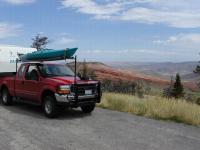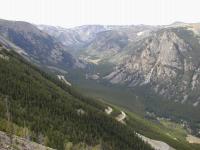Near Lolo Springs
Montana
Welll, let's see. It's been near a week since we last spoke. A work week, anyway. (Shudder. Sorry about that.) At that time, I'd just settled into a beautiful lakeside spot on the Buffalo Bill Reservoir, west of Cody, Wyoming.
I got a lot of mundane necessities taken care of in Cody. Changed my oil at Walmart, washed some clothes and the truck, cashed a large check, bought groceries. On the 2nd day, I went to the Buffalo Bill Museum complex. ($15, good for 2 days.)
Did it in one afternoon. Wore me out. Something like 4000 rifles and pistols, displayed on two floors, and another large wing of western art and sculpture. A fair selection of Remington sculpture, and some modern paintings of a similar theme. I particularly liked the illustrated letters Remington sent to friends, little quick miniature drawings and paintings of what he was doing. Some only a couple of inches across, on a corner of a page.
The wing dedicated to the personal history of Bill Cody was moderately interesting. This guy was a movie star before there were movies. He has no modern equivalent. Suppose, for the moment, that before John Wayne made movies about WWII, he actually led marines onto the beach at Iwo Jima. Something like that. Like Audie Murphy, maybe, if he'd been a more convincing actor.
Bill Cody was the real thing when he was young, a hunter and killer of many, many buffalo and a moderate number of Indians in his decade or so of service as an Army scout and forager after the Civil War. Instead of diminishing as he grew older, as most of us do, he became something more than real. Taking his cue from a couple of fanciful tales by the dime novelist Ned Buntline, he created a pageant called the Wild West Show, and thus became as responsible as anyone for spreading throughout the country, and later the world, a certain manly and romantic vision of the Old West. He became his own legend, and made a good living at it. The last generation of the 19th century, and the first of the 20th, came to see him as the embodiment of a stillborn West, buried alive beneath a tide of immigration and barbed wire fencing, most all of which was bought, brought, and sold by the railroads.
As such, he dined with Presidents and Kings.
My own impression is that the Wild West existed, but never for long in any one place. It was like a self-limiting low fire that flickered through the land and then moved on, following the transient fuel of volatile lawless men and hardnosed fortune hunters. It was said of Liver-Eatin' Johnston, for instance, that "he never betrayed a friend nor gave quarter to a foe." Which he perceived you to be, however, may have depended heavily on how much he had to drink that day, or that week.
Johnston got his notorious nickname early on, when he was observed hacking the liver out of an Indian he had killed, and eating it raw. Later he denied the incident. I read all about this in the county museum in Red Lodge. There's several photographs of him there, all showing a sturdy-looking older man with a full beard covering up his features, often holding a rifle in a careless, familiar way. Johnston lived a lot longer than he had any right to expect, given his diet and proclivity for violence. The last word on the matter went something like this: A recently deceased resident of Red Lodge, as a small boy, saw the aged Johnston on the street. As small boys will, he just went up and asked him, "Did you really kill Indians and eat their livers?" The rough old man looked down at him, unsmiling. "That's what they say, sonny."
Perhaps it was a good career move, given the environment. For a while Johnston was a deputy sheriff of Coal County, Montana, with responsibility for Red Lodge, and after a bit the sheriff noticed he seldom arrested anyone. When questioned, he claimed that he never had to arrest a man twice. After the first encounter they either left the area or decided to quit annoying him.
If you come through Cody, go to the museum and see what's left of all that. It's worth the 15 bucks.
A couple of motorhomes were carrying Vespa-like Honda scooters on their back bumpers. These looked interesting, for quiet local travel. I'll have to find a dealer and try one out.
I camped in Parkside CG in the Gallatin NF, 16 miles up from Red Lodge, along a roaring creek. That's plenty good sleeping. Temps in the 40s at night. I have yet, though, to pull out the down comforter. Maybe up in Canada.
In Red Lodge, I ate lunch at the Pollard Hotel, once the Stafford, an elegant old building where the likes of Cody and Liver Eatin' Johnston used to knock back the cheap whiskey. The chicken salad sandwich was good but pricy. I asked the young waiter what was the best thing on the dinner menu.
He sighed.
"Well, used to be the rib-eye, with the stilton cheese dressing, but.... well, y'see, there's new management, and the old chef left in November....tourists would rather have a 5 dollar hamburger....we...we used to be 4 star here...." He trailed off.
"Used to be." A word to the wise. I took the hint anyway. It is a fine old building, though.
In great things and small, history moves right along. You can move along with it, or attend the elaborate funeral. It's usually a good show.
Closed casket, of course.
Bob



No comments:
Post a Comment